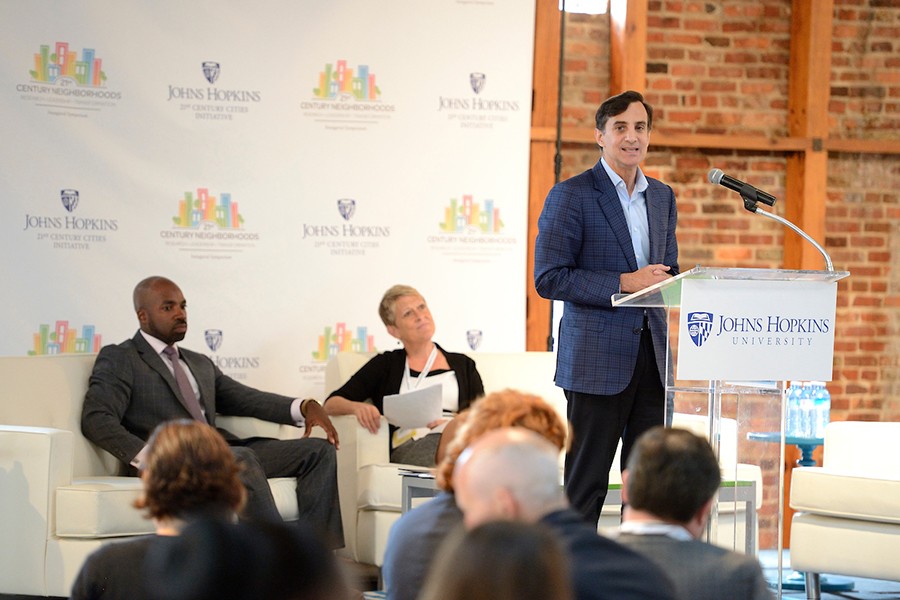The mayor of Atlanta, Kasim Reed, said he's been straight with longtime residents around Turner Field, an area of the city poised for major redevelopment efforts.
Reed and his staff members, he said, go around bluntly telling these residents: "Do not move. And if someone comes to buy your house, give the city a call."
The mayor was among the panelists yesterday at Johns Hopkins University's inaugural 21st Century Neighborhoods symposium, discussing some of the trickier dimensions of urban revitalization. Like how to make sure, when a distressed neighborhood finally prospers, that original homeowners see the benefits rather than moving out.
Or how giving a schoolkid a pair of glasses can serve as a violence prevention strategy.
Or how a city's well-intentioned measure to pass a $15 minimum wage can end up disqualifying employees from receiving federal subsidies they still need.
Convened by JHU's 21st Century Cities initiative, the symposium in Baltimore this week brings together city and federal leaders, academics, and other urbanism experts from more than 30 cities across the country. In addition to officials from the Obama administration, 10 mayors are attending the two-day event, including the mayors of Philadelphia; Charlotte; Kansas City; San Jose; and Camden, New Jersey. Also attending are police chiefs, agency heads, and city council members.
Also see
The idea for this gathering, said Kathy Edin, the Johns Hopkins sociology professor and faculty director of the 21CC initiative, is to share "the latest research, greatest challenges, and boldest ideas" coming out of U.S. cities and neighborhoods. Ben Seigel, executive director of 21CC, says the hope is to make the symposium an annual event.
Launched in 2014, 21CC is an interdisciplinary effort to help revitalize American cities, starting but not ending with Baltimore. Folded within the initiative is JHU's Center for Government Excellence, or "GovEx," which helps cities create data infrastructures to transform their government operations. Both are involved in this week's symposium.
Baltimore entrepreneur Chris Wilson opened the event Thursday with a personal story and got a standing ovation after sharing how he turned around a young life of trauma and violence—and an original life sentence—with an ambitious personal transformation within prison walls.
One panel—featuring Karol Mason, assistant attorney general with the U.S. Department of Justice—explored the links between crime and public health.
Baltimore City Health Commissioner Leana Wen discussed a recent rash of burglaries at the city's community health clinics that have left the facilities rampaged and workers devastated. But she pointed to a small detail of these crimes that stuck with her: From the clinics' fridges, the perpetrators had taken sandwiches. Week-old sandwiches, left behind by employees.
There's a "deep-rooted trauma" behind crimes of this nature, Wen suggested.
Thursday's symposium at the American Visionary Art Museum also allowed specific cities to showcase unique strategies, like the decade-old "Kalamazoo Promise," a program that awards free or discounted state college scholarships to all public high school graduates in the Michigan city.
Today's events, at the Royal Sonesta Harbor Court Hotel, include a discussion by Johns Hopkins University professors on how academic data translates to "real life" applications for cities. Other panels focus on strategies for housing, education, and public safety.
The symposium has also debuted a new publication from 21st Century Cities: a playbook for federal and local partners to work together to address "stubborn challenges and unexpected crises."
This week's symposium is the first national gathering 21CC has hosted.
"Our mission is not small," Edin said Thursday, outlining the goal of "lifting up distressed communities."
Johns Hopkins President Ronald J. Daniels pointed to the "power of data and evidence to shape our cities," describing the symposium as "fertile ground for sharing best practices."
During one panel, Dana Redd, mayor of Camden, New Jersey, stopped to remark: "I'm glad that we're having these conversations with other people in other cities."
Posted in Politics+Society
Tagged urban renewal, kathryn edin, 21st century cities, center for government excellence









